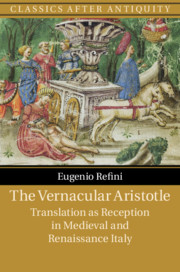Book contents
- The Vernacular Aristotle
- Classics after Antiquity
- The Vernacular Aristotle
- Copyright page
- Dedication
- Contents
- Figures
- Series Editors’ Preface
- Acknowledgements
- Notes on the Text
- Introduction
- Chapter 1 Taming the Philosopher
- Chapter 2 The Master of Those Who Know (and Those Who Don’t)
- Chapter 3 Family BusinessReadying the Ethics for the Layman
- Chapter 4 The Philosopher, the Humanist, the Translator and the Reader
- Chapter 5 Abridging the Philosopher(s)
- Conclusion
- Bibliography
- Index
Chapter 2 - The Master of Those Who Know (and Those Who Don’t)
Published online by Cambridge University Press: 10 February 2020
- The Vernacular Aristotle
- Classics after Antiquity
- The Vernacular Aristotle
- Copyright page
- Dedication
- Contents
- Figures
- Series Editors’ Preface
- Acknowledgements
- Notes on the Text
- Introduction
- Chapter 1 Taming the Philosopher
- Chapter 2 The Master of Those Who Know (and Those Who Don’t)
- Chapter 3 Family BusinessReadying the Ethics for the Layman
- Chapter 4 The Philosopher, the Humanist, the Translator and the Reader
- Chapter 5 Abridging the Philosopher(s)
- Conclusion
- Bibliography
- Index
Summary
Chapter 2 moves from Dante Alighieri’s contribution to the establishment of the vernacular as a language of knowledge and his critique of contemporary vernacular translation, which offer yet another perspective on the multifaceted process through which vernacular culture appropriated and, in a sense, tamed Aristotle’s authority. The chapter situates Dante’s portrayal of Aristotle within the poet’s broader reflection on language. Taking the appearance of Aristotle in the Divine Comedy as a starting point, I show that Dante’s notion of language cannot be understood without looking at his discussion of the relations between Latin and the vernacular, particularly in the Convivio. From this point of view, Dante’s harsh criticism of Taddeo Alderotti’s Italian translation of the Summa Alexandrinorum invites us to reconsider the failure of the Convivio itself, a project which did not foster the cultural revolution that Dante sought. By exploring the textual transmission of Taddeo’s translation between 1300 and 1500, the final section of the chapter enlightens its relevance to the vernacular reading communities that found forms of cultural and social legitimation in works of this kind.
Keywords
- Type
- Chapter
- Information
- The Vernacular AristotleTranslation as Reception in Medieval and Renaissance Italy, pp. 51 - 85Publisher: Cambridge University PressPrint publication year: 2020

